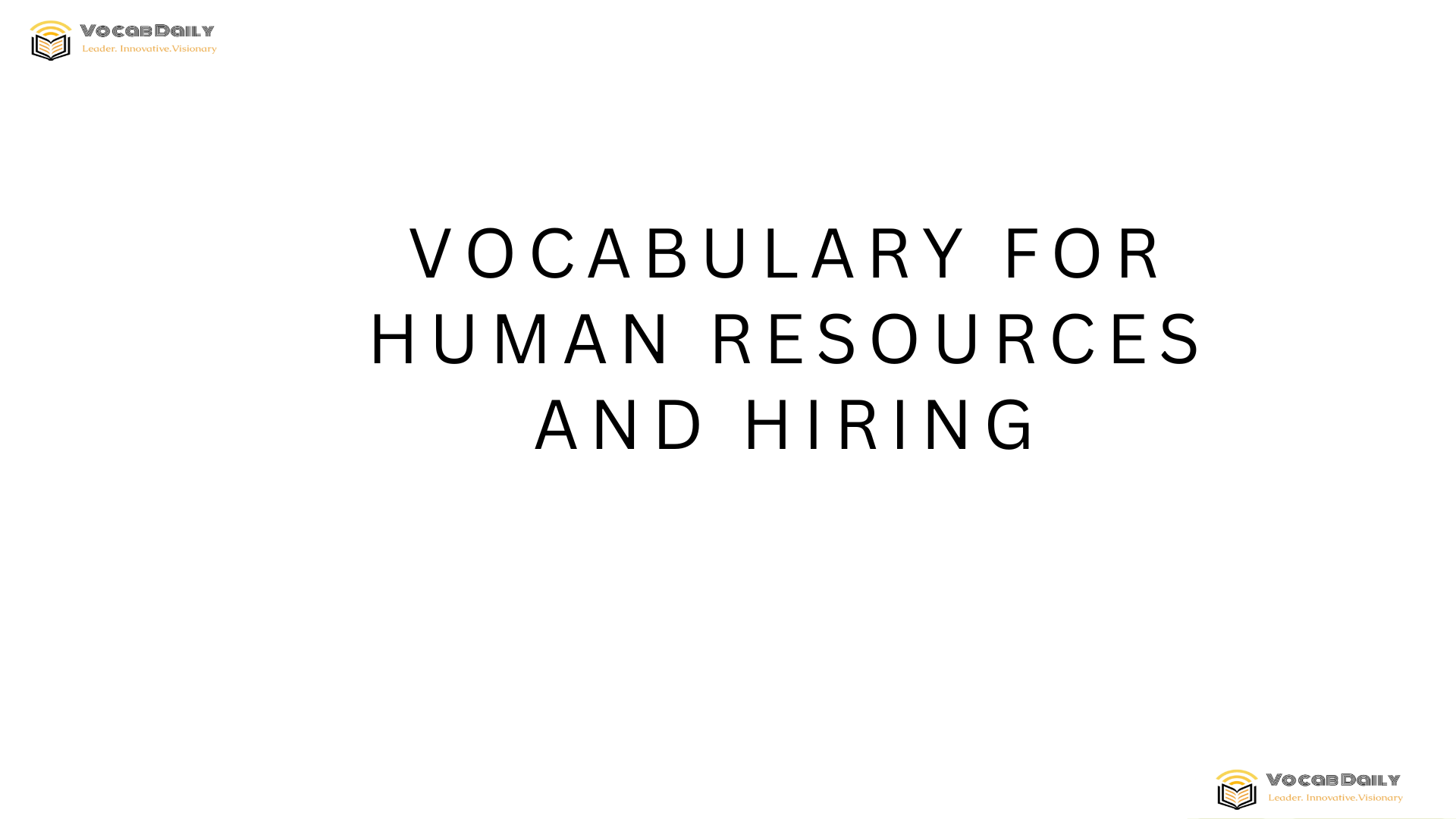Essential Terms in Human Resources
Human Resources (HR) plays a crucial role in any organization by overseeing employee relations, recruitment, and compliance with labor laws. Understanding the specific vocabulary used in HR helps professionals communicate effectively and manage human capital efficiently. Key terms such as recruitment, onboarding, turnover, and retention form the foundation of HR discussions.
Recruitment refers to the process of attracting and selecting candidates for employment. Onboarding is the process of integrating new employees into an organization. Turnover describes the rate at which employees leave and are replaced, while retention measures how well companies keep their talent. These words are commonly used in business environments and essential for anyone involved in managing workforce-related tasks.
Common Hiring Vocabulary
Hiring vocabulary is important for both employers and job seekers to understand the stages and expectations of the recruitment process. Terms like job posting, applicant tracking system (ATS), interview, and offer letter are part of every hiring conversation.
Job posting refers to the public announcement of a job opening through various platforms. An Applicant Tracking System (ATS) is specialized software that helps HR teams organize, track, and manage job applicants. Interviews are structured meetings where employers assess candidates’ suitability, and the offer letter is the formal job proposal sent to a successful applicant.
Employee Performance and Evaluation Words
Once hiring is complete, managing employee performance is vital. Performance appraisal, feedback, and key performance indicators (KPIs) are essential terms to know in this area. Performance appraisal is a regular review of an employee’s work performance, often involving a meeting between the employee and their manager.
Feedback refers to the information provided to employees about their work, aiming to improve future performance. Key Performance Indicators (KPIs) are quantifiable measurements used to evaluate an employee’s success in meeting objectives. Proficiency in these terms is critical for communicating expectations and fostering growth in the workplace.
Salary and Benefits Vocabulary
Understanding compensation vocabulary is critical in HR, as salary and benefits are among the most motivating factors for employees. Words like base salary, bonus, health insurance, and retirement plan are frequently used in negotiations and documentation.
Base salary is the initial rate of pay an employee receives before bonuses or benefits. A bonus is additional compensation awarded based on performance or company profits. Health insurance and retirement plans are common benefits provided by employers to support employees’ health and future financial security.
Legal Terms in HR and Hiring
HR professionals must be familiar with legal vocabulary to ensure compliance with labor laws and workplace regulations. Terms such as Equal Employment Opportunity (EEO), discrimination, harassment, and compliance are frequently encountered.
Equal Employment Opportunity (EEO) refers to the principle that all individuals have the right to equal treatment in hiring and employment without discrimination. Discrimination involves unfair treatment based on protected characteristics like race, gender, or age. Harassment describes unwelcome behavior that creates a hostile work environment. Compliance indicates adherence to laws and policies that regulate workplace conduct.
Workplace Culture and Employee Relations Vocabulary
Creating a positive workplace culture is a priority for HR teams. Terms such as engagement, morale, team-building, and conflict resolution capture critical aspects of employee relations.
Engagement refers to the emotional commitment employees have to their organization and its goals. Morale reflects the overall mood and satisfaction within the workforce. Team-building involves activities designed to strengthen interpersonal relationships, and conflict resolution is the process of addressing and solving disputes to maintain a harmonious work environment.
Types of Employment Contracts Vocabulary
Employment contracts define the terms of workers’ engagements with employers. Understanding the terminology behind these agreements is vital for HR teams, such as permanent contract, temporary contract, freelance, and probationary period.
A permanent contract is a long-term employment agreement without a fixed end date. Temporary contracts last for a specific period or project. Freelance work involves self-employed individuals who provide services on a flexible basis. A probationary period allows employers to assess new hires for a set timeframe before confirming permanent employment.
Recruitment Strategies and Related Vocabulary
Effective recruitment requires knowledge of various strategies and terms, including headhunting, talent pool, referral, and passive candidate.
Headhunting refers to the targeted search for highly qualified candidates, often for senior or specialized roles. Talent pool is the database of potential candidates who may be considered for future openings. Referral programs encourage current employees to recommend candidates, while passive candidates are skilled professionals not actively looking for a job but may be open to opportunities.
HR Technology and Tools Vocabulary
HR departments increasingly rely on technology to streamline processes. Familiarity with terms like HRIS (Human Resource Information System), payroll software, learning management system (LMS), and e-learning helps in understanding modern HR operations.
HRIS is a software solution that combines HR functions such as payroll, benefits administration, and employee data management. Payroll software automates salary processing and tax calculations. Learning Management Systems (LMS) provide platforms for employee training and development. E-learning refers to digital courses and training accessible online for employees.
Important Interview Vocabulary
Interviews are a critical stage in hiring, and knowing the relevant vocabulary can enhance communication. Words such as behavioral interview, panel interview, competency, and follow-up are significant here.
A behavioral interview focuses on assessing candidates’ past behavior to predict future performance. Panel interviews involve multiple interviewers assessing one candidate simultaneously. Competency refers to specific skills or abilities required for a position, and follow-up involves communication after the interview to express continued interest or request next steps.
Workforce Planning and Development Vocabulary
Strategic workforce planning ensures that an organization has the right people in place to meet future needs. Key terms include succession planning, talent management, upskilling, and cross-training.
Succession planning prepares employees to fill key roles in the future. Talent management focuses on recruiting, retaining, and developing employees. Upskilling involves training staff to improve existing skills, while cross-training teaches employees multiple roles or tasks to increase flexibility within teams.
Also check out VocabDaily workbook collections.

Leave a Reply